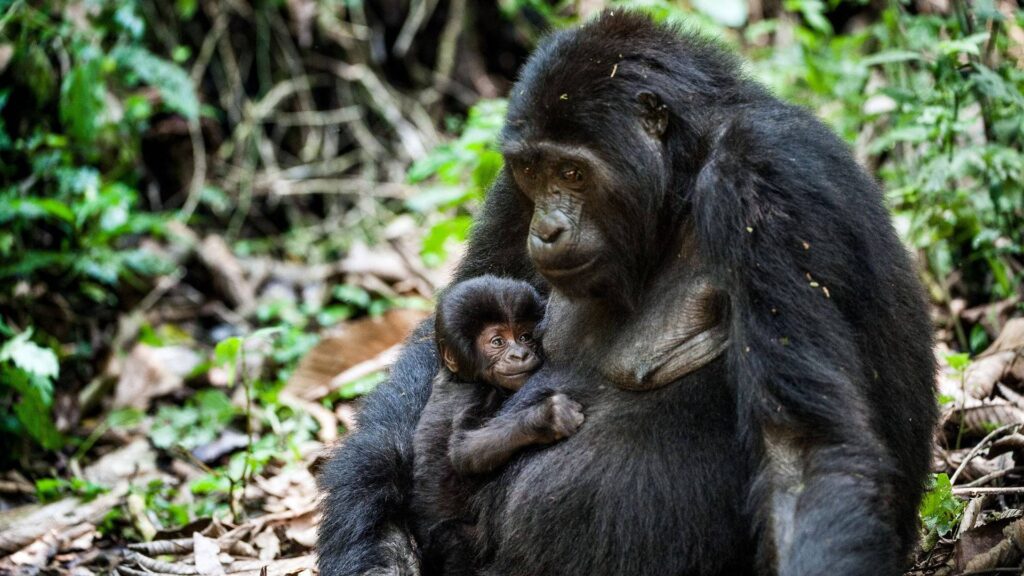Is Gorilla Trekking Ethical?
Is Gorilla Trekking Ethical?: The most popular tourist activity in the Democratic Republic of the Congo, Rwanda, and Uganda is gorilla trekking. The most amazing life experience that one should not pass up when on an African safari is getting to meet these animals. Since gorillas draw a lot of people to Africa, gorilla trekking entails spending time with them in their natural habitat as they go about their everyday lives.

Thankfully, there are many who contend that excessive human interaction with monkeys violates their privacy and may cause them to become ill, uncomfortable, or hostile. It is unethical to use drones, take pictures of gorillas, or record videos during gorilla trekking.
Regarding the outstanding work of primatologists, Dian Fossey established a research center on how to get up close and personal with monkeys. Additionally, she advocated for the gorillas to be left alone in the wild.
It is crucial to keep in mind that gorillas reside in underdeveloped nations where there is little funding to conserve the primates that are not raised for tourism. The only dependable method of managing the resources required for gorilla conservation is gorilla tourism. In addition to the local government, several organizations have come forward to promote gorilla conservation. Because they saw no immediate benefits to the primates, government authorities were less inclined to safeguard them. Some want to persuade poachers. The local government is motivated to safeguard the primates since gorilla trekking has had a significant impact on tourism through money.
A gorilla permit, which costs USD 1500 in Rwanda, USD 700 in Uganda, and USD 400 in Congo, is required in order to participate in gorilla trekking. Despite their potential cost, the permits are worthwhile. Furthermore, gorilla trekking is ethical because it is the only method to raise the money required for initiatives linked to gorilla conservation.
The government has been able to support the conservation area, establish hospital facilities to treat the sick, pay Game Rangers, and conduct ongoing research on primates thanks to the money raised from primate visits. Gorilla trekking is morally right because of this.
Because gorilla trekking is governed by stringent regulations, it is morally acceptable. As a result, gorilla trekking policies and procedures serve to safeguard primates, preserve their natural environments, and end any kind of suffering.
During the gorilla trekking briefing, rangers provide guests with the gorilla trekking rules. These precautions were all taken to shield the primates from any risks or harm.

Be aware that the number of mountain gorillas has grown over time. For instance, when Uganda‘s Bwindi Impenetrable National Park was created in 1993, there was just one gorilla family; today, there are 17. This is because the porters who used to murder them were retrained and hired as game rangers, guides, and porters; now, they are the monkeys’ defenders. This is due to gorilla tourism, which has created jobs for many residents of the park’s surrounding settlements to maintain the forest. Some residents work as hotel employees and tour guides. Some residents have a craft center where they sell distinctive craft supplies that visitors purchase while in the national park, earning them the money they need for their own consumption.
Additionally, the governments of Rwanda, Uganda, and the Democratic Republic of the Congo now rely heavily on gorilla trekking as a source of income. The money raised from gorilla trekking is utilized to create schools, hospitals, roads, and other infrastructure to help the local communities become more self-sufficient. In addition to raising awareness of the value of animal species, the trek’s economic worth has inspired local communities to work together for conservation and protection.
Gorilla trekking is therefore morally right since it has aided in the growth of numerous industries in the nations where the parks are located. Poaching, the pet trade, and opposition to gorilla groups have all been reduced thanks to gorilla trekking. Gorilla trekking is therefore a morally righteous and memorable pastime.



